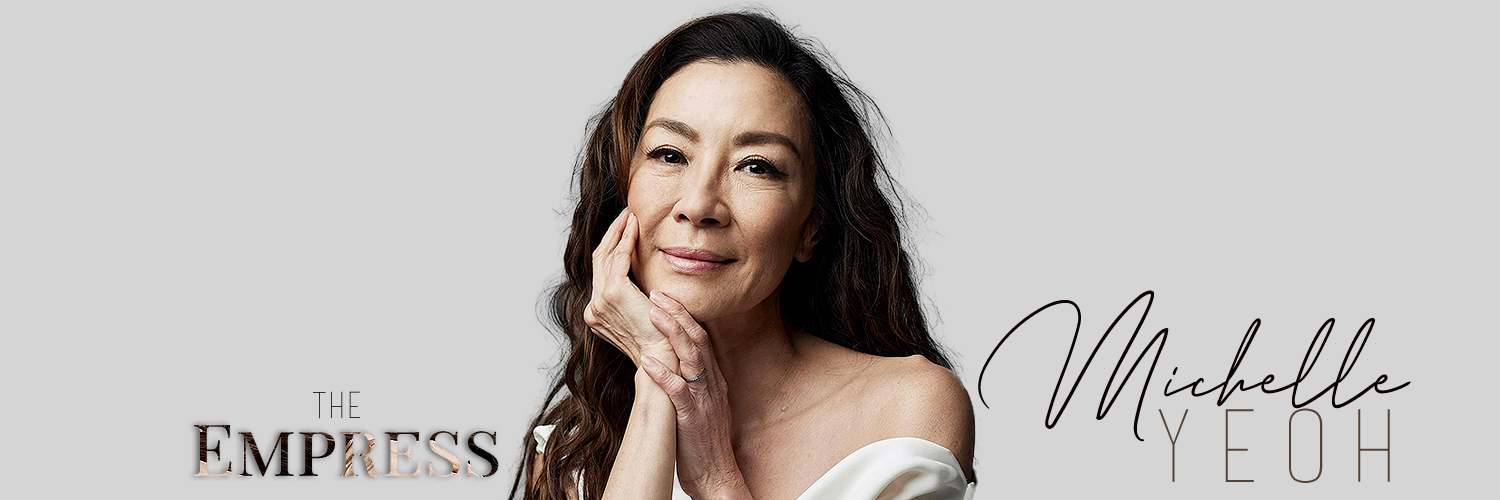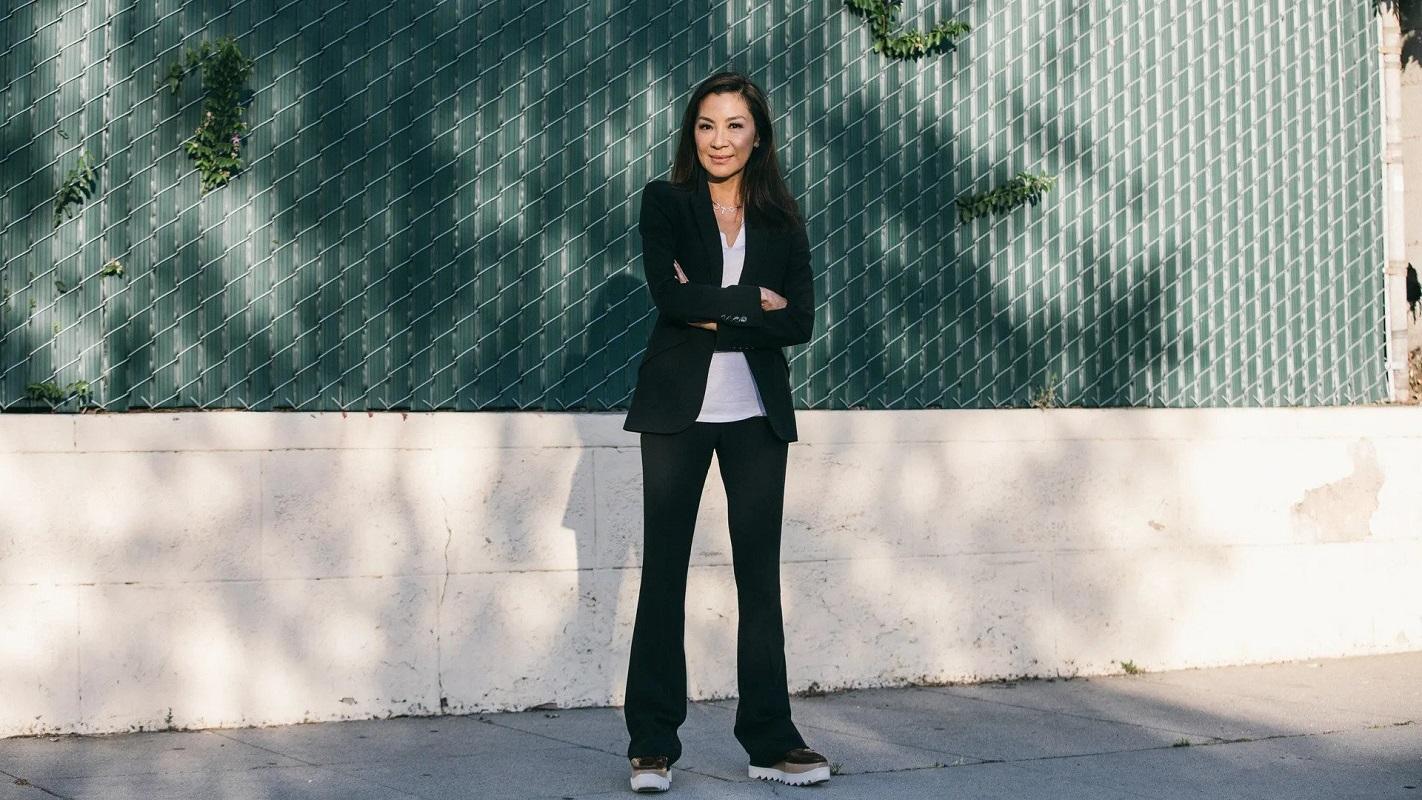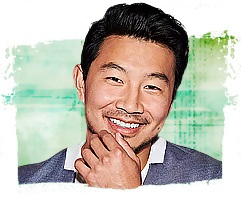
Crazy Rich Asians’ Michelle Yeoh Has Kicked Ass for Three Decades
Michelle Lhooq
August 17, 2018

The Malaysian star has had a prolific and exceptional career by being one of the most physically gifted actresses alive.
“I have two moves,” says Michelle Yeoh. She puts her glass of wine down to demonstrate the stunts that have become her trademark over the last three decades she’s spent kicking ass. The actress, who first carved out her career as the reigning heroine of ‘80s Hong Kong martial arts movies, is a rarity in Hollywood: a female action movie star known not just for her looks, but for her stunning physical prowess. Watching Yeoh move is like falling prey to a beautiful, deadly beast—you marvel at her tiger-like grace as she flies through the air, then you’re dead before you realize you’ve actually been slayed by a goddamn dragon. (She’ll explain that distinction later).
“One move goes like this… across their head—boom!” Her hand slices past my neck like a knife before I can blink. “The other one…” she continues, leaning forward as her perfectly blown-out hair spools over the shoulder of her tuxedo blazer. “I hold him, bring him down, and hit him over the head with my leg.” Flicking her arm, she mimics how her foot would pinwheel from behind with Chinese acrobat-level flexibility. “The scorpion kick,” she adds, reaching for her glass to take another sip, eyes twinkling.
Yeoh is sitting on a late-June afternoon in the lobby of Milk Studios—a photo studio complex in Los Angeles so chic you’d half-expect a pool party on the roof—to promote Crazy Rich Asians, the first Hollywood studio production with an all-Asian cast since 1993’s Joy Luck Club. It marks the first time most Asian-Americans under 25 are seeing themselves reflected on screen, not just as stereotypes or sidekicks, but as complex characters with compelling stories (and hot Asian boyfriends).
It may seem strange to compare a rom-com like Crazy Rich Asians to Get Out or Black Panther, but these films are successful litmus tests for the commercial viability of representation in Hollywood. Transposing the classic “meet my insane parents” storyline into Asia’s newly-minted luxury class, Crazy Rich is told from the perspective of an Asian American (a New York City professor played by Constance Wu) navigating the late-capitalism-meets-Confucianism codes of Singapore’s hoity-toity. Yeoh plays the domineering villain as the protective mother of Wu’s main squeeze, the perfectly chiseled Henry Golding—and honestly, she steals the show.
In order to understand Yeoh’s commanding presence, you have to first understand that she is one of the most physically gifted actresses alive. “It’s how she holds herself,” says Golding. “When you’ve trained your body so much, you know your muscles, your stance. She poises herself like a dancer—lithe and sort of ethereal—and that translates into elegance on screen.” There’s something fascinating about an actress who has made her name not through sex appeal, but the way she moves, punches, and scorpion kicks. Hollywood rarely allows women to be powerful like this. To be taken seriously, they must be EMOTIONAL and FRAGILE. Instead, Yeoh is STRONG and PLACID and GOOD AT BEATING PEOPLE UP.
Yet there is also a sense that, despite being one of the most accomplished actresses in Asia, Yeoh’s always been slightly underrated in the West. When I told American friends I was writing this story, I wasn’t surprised that many were like, “Who?” It’s a symptom of Hollywood’s lingering reluctance to cast Asian women in leading roles; beyond Lucy Liu, Margaret Cho, and perhaps a handful of others, how many Asian actresses in Hollywood can you think of? Crazy Rich Asians director Jon M. Chu puts it more bluntly: “She should have much more recognition. She should be on the same level with a Meryl Streep.”
Action movie stars often seem smaller in person than on screen, and Yeoh is no exception to the Tom Cruise effect. When I first spot her earlier that afternoon in the studio’s dressing room, it takes me a beat to recognize her as the legend I grew up watching as a kid in Singapore, where Yeoh was a symbol of local pride as the humble girl from Southeast Asia who’d made it to the upper echelons of Hollywood.
Fresh off a Vanity Fair shoot, she’s taking a breather from a busy day of photos and interviews, sitting on a couch with her slender wrists clasped on her lap. A red sequined dress envelops her petite frame and thick fake lashes embellish eyes like bottomless black wells, giving her the vibe of an Asian tai-tai at the charity gala. Her hair is teased into a voluminous plumage with a wavy side part evoking the glamorous stars of old Hong Kong cinema—which is, of course, exactly what she was.
Yeoh was born in Ipoh, Malaysia on August 6, 1962 with feline energy all over her cosmic charts as both a Leo and a Chinese zodiac tiger. Describing herself as an “extremely competitive athlete,” Yeoh literally ran circles around her convent schoolmates—winning her junior squash championship, in addition to doing ballet, table tennis, and diving. (Her parents also made her play the piano, because duh, Asian.)
Her natural athleticism and intense drive brought her to London’s Royal Academy of Dance, where she dreamed of becoming a ballet dancer. That career was derailed during a school break in her final year, when she came back to Ipoh and was horrified to learn that her mother had secretly entered her into the Miss Malaysia beauty pageant. “Oh god,” Yeoh says, rolling her eyes when I mention her pageant queen past. “I’m going, ‘Mom, what on earth are you talking about? This is crazy!’ I wasn’t the one who wanted to put the dress—I liked the rough and tumble more.”
Yeoh decided to compete just to get her mom off her back, but she ended up winning. And just before she had to give her crown up, she suddenly got a phone call that swerved her life completely off-course.
“I was in Kuala Lumpur and had just come back from a squash game, all sweaty,” Yeoh recalls. “Phone rings, I pick it up, and my friend says, ‘Come to Hong Kong. Faster. Tomorrow. Get on the flight!’” Yeoh’s friend had been at a dinner where Chinese mogul Dickson Poon had announced he was looking for an actress to star in TV commercials for his fashion franchise, alongside reigning male film stars like George Lam and Chow Yun-fat. The friend had whipped out a photo of her, and Poon was interested.
“So I took a meeting, and Mr. Poon said, ‘Would you like to shoot the commercial tomorrow?” Yeoh says. “That was my first meeting with Jackie [Chan]—the first person I worked with in Hong Kong.”
Do you and Jackie still hang out?
“Oh yeah, we’re very good friends. Jackie is what you see is what you get. He’s a lot of fun to be with, but he eats too fast. I think it’s conditioning, since he grew up in a performing troop. If you eat slow somebody is going to eat your food. He never knows how to sit down and eat—he’s always standing up.”
That commercial paved the way for Yeoh’s acting career. After a few bit parts in smaller movies, she landed a starring role as a police inspector in 1985’s Yes, Madam, produced by Poon’s company D&B Films, in which she performed her own stunts—just like Chan. Yes, Madam single-handedly spawned the “girls-with-guns” subgenre in Hong Kong cinema. “That craze was wildly popular for a few years, and the movies got really cheap, really fast,” says Grady Hendrix, Asian film expert and co-founder of the New York Asian Film Festival. “Yeoh managed to transcend the genre while other performers got stuck in it.” In 1988, Yeoh married Dickson Poon and took an acting hiatus right as the genre was in decline. When they divorced in 1992, she returned to work, playing ass-kicking heroines in ‘90s classics like Supercop (with Jackie Chan) and Wing Chun.
“She came back in a series of really high-profile movies, so she had this shine on her and was considered a movie star rather than B-list,” says Hendrix. “Even at the height of her comeback, she was in appearing in movies that took real risks. She’s always been very smart about what she’s doing. She was surprisingly picky about projects—which is unusual in Hong Kong, where the number of movies they do would make an American actor explode.”
Yeoh worked hard to translate her natural athletic prowess into martial arts stunts, hitting the gym for up to 11 hours everyday. Fighting on camera, she says, is like a delicate dance between two people, and a fumbled high kick could be fatally embarrassing.
“At the beginning, people were very curious: Really? Beauty queen? Ballerina?” Yeoh recalls. She acts out a common scenario from her early days in a physical way that highlights her comedic timing, and makes me wonder if Hollywood let more women be funny, could she have been the female Jackie Chan? Yeoh pretends to be a stuntman in a scene where he assumes he’s fighting another man. “The guy goes, ‘Ahhhh!!!’” Yeoh flies towards me with fierce scream, lifting her arm high in the air like she’s about to slam down and strike. “Then he realized it was a woman, and you could see him go, ‘Ehhh???’” Her hand goes from a chopping motion to a tremering wriggle that hovers above my chest like a confused snake as her eyes bug out with bewilderment. We both bust out into giggles, and she adds, “The director would be like, ‘What the hell is going on?!”
Hong Kong’s action film industry back then could also be kind of scrappy; in 1993’s Holy Weapon, Yeoh flies through the air amidst exploding body parts and horse heads that look laughably fake. “It’s not like in America or Europe where you have weeks of rehearsals,” she explains. “When I first started, it was like: Go to the set, they’ve just finished choreographing, you learn it, and shoot right away.” Yeoh says she’s able to stay mentally focused and calm in the face of any batshit craziness that might be flying at her, thanks to her training as an athlete. “If given the opportunity, I just go kick ass. I’ve always had that attitude since I was a kid.”
She crossed over the U.S. in 1997, landing in Hollywood on the back of James Bond’s motorcycle in Tomorrow Never Dies. Coming over to the West was a risk. “I was having a great time doing Hong Kong films and just hanging out and having fun. Coming to America meant starting all over again,” Yeoh says. But she was excited by the opportunity to play a new kind of Bond girl: a fighter in her own right. The movie even hired a Hong Kong stunt coordinator so that she could do her own combat, authentic to her intricate fighting style. “She’s equal to Bond, so all the Asian girls are going, ‘Hey, I can be a spy too,’” Yeoh says. “What was amazing with Pierce, he was so confident a man that he goes, ‘Yeah, let her fight!’ Then he would just stand there like a proud dad.”
Overnight, Yeoh became a ‘90s It girl, appearing in tabloid magazines (including People’s Most Beautiful list) and winning an MTV Movie Award for Best Fight. But Hollywood didn’t exactly welcome her with open arms. “When I first came to do movies here, I remember very specifically someone said, ‘If we cast an African-American lead, there’s no way we can cast you, because we can’t have two minorities,’” Yeoh says.
She found herself turning down role after role asking her to play fragile Asian women—the “Ming Vase” stereotype, as she puts it. “I would not do something that I didn’t believe in. I’ve just come from doing such a strong powerful role,” Yeoh says. “The next movie I did was Crouching Tiger, Hidden Dragon, and it was a two-year gap.”
Ang Lee’s Crouching Tiger, perhaps the most talent-stacked and expensive wuxia movie ever made, put Yeoh’s one-two punch of emotional gravity and physical virtuosity on full display. Because she grew up speaking English, Cantonese, and Malay, Yeoh also had to pull off speaking Mandarin by learning her lines for each scene phonetically.
“Sometimes I wish that if I had a really strong mentor, maybe I could have done more,” Yeoh says, noting at the same time that she and her posse of Hong Kong A-listers, including Jackie Chan and Chow Yun-Fat, have battled their way through the industry while looking out for each other. When I point out that there were no other women doing what she does, she counters, “When I wanted to do my first action movie, a few strong business women in film championed it and said, ‘Yeah let her try! You bring a very exotic girl from Malaysia. She’s not our usual Hong Kong girl. Why stick her in the same kind of roles?’ So it was the ladies in the company who stuck up for me.” I press further, asking what stones she feels went unturned in her career. Again, she gracefully deflects my attack: “I’m very happy with the career that I’ve had. I don’t dwell on missed opportunities because that would be wasting time.”
Yeoh flexes all her talents in Crazy Rich Asians, where the fighting takes place in the form of mental jiu jitsu hashed out over dagger-eyed death stares in lavish dinner parties. Says Henry Golding: “If looks could kill, holy crap, Michelle is slaughtering.”
Yeoh could have easily slipped into the campy caricature of the domineering Asian mother. Instead, she again insisted on not playing into stereotypes, choosing to telegraph how her character’s protectiveness stemmed from Asian values of self-sacrifice and family. Chu remembers her telling him when he first called her about the role: “She said, ‘I read the book, and if you want me to be a villain, I’m not going to do the film. I have to defend our cultural ideas and thoughts to the best of my ability, and I wouldn’t be able to go home if I just played a villain tiger mom.’”
Yeoh prefers to call her character a “dragon mom,” with dragons being the most powerful yet benevolent creatures in Asian culture. According to Chu, her mothering also extended beyond the screen—he describes her “mama bear” when they were filming in Southeast Asia. “In Malaysia, she is a queen and literally everyone is opening the doors for her everywhere she walks,” he says. What struck him though, was how she listened to all the Asian-American actors as they told her about their experiences in the industry. “It was her whole being, how kind she was to everybody.” (I notice this attentiveness too when the GQ photographer waves goodbye to Yeoh after their shoot. When the publicists and I giggle over how cute he is, Yeoh cheerfully tells us where he’s from and how long he’s been in L.A.)
Back at the studio, the day is finally wrapping up, and Yeoh is the last one to finish. One by one, Crazy Rich cast members walk up to pay their respects as she gets her makeup removed and hair redone in a chair by the mirrors. First Sonoya Mizuno and Chris Pang come by, chatting excitedly to her about their party plans for later in the evening. Then Golding pops his head through the curtains to flash her a dimpled smile and wave goodbye.
Finally, Yeoh gets up, and trailed by a gaggle of publicists and walkie-talkied production managers, we stroll to the exit together. Earlier, I’d asked if she wanted to grab a bubble tea with me around the corner, and her face had brightened as she nodded an enthusiastic yes. But now it’s getting late and I’ve forgotten to bring a jacket, which she gently scolds me for.
So we just take a selfie. “Did you just stick out your tongue?” she says with mock incredulity, playfully batting my arm. Then her grip tightens and she gazes at me intently. “Take care of yourself,” she says. Then the doors are held open for her as she glides into the golden light outside. When I turn my head to watch her go, she’s already vanished into the Hollywood sunset. Who knows where she’ll go next?









